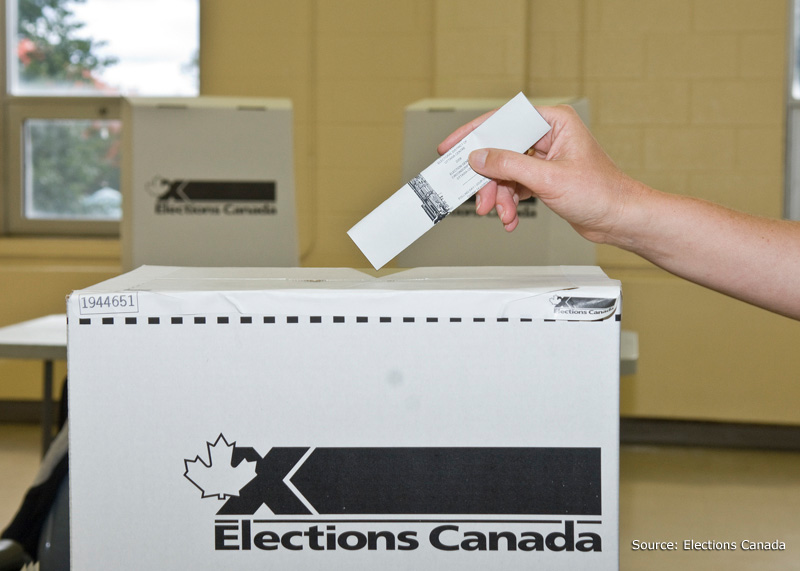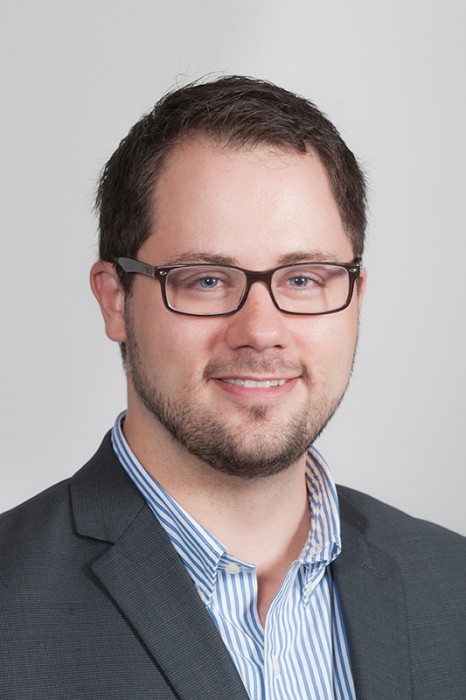
Advice, insights and a plug for the largest survey in Canada
Royce Koop is an associate professor in the department of political studies and he gets interviewed a lot; a quick search brings up Globe and Mail, CTV, Globe and Mail again, Winnipeg Free Press and many others in the last few weeks alone.
UM Today wanted to ask the 2014 RH Award Winner and award-winning author a few questions about the federal election campaign, and about one of the largest surveys in Canadian history. He obliged, giving yet another interview.
UM Today: What is Local Parliament Project, and why we do need it?
Royce Koop: It’s a big project. The idea of Local Parliament is to explore the intersection of the local and national in Canadian election campaigns.
Part of what this entails is a survey that is going on during the election campaign. It is one of the biggest surveys in Canadian history. The idea of the survey is to have a huge number of people, and to have enough people in almost every single constituency, that we can actually say something interesting about each individual race.
The problem with a national survey is you get a few people, say, in the riding of Winnipeg South. You don’t typically get enough people to say anything authoritative or interesting about what’s actually happening in Winnipeg South. Whereas with us, we will get enough people to talk about the dynamics of the race – what were the important issues in the campaign, what were the important things that drove vote choice. And we can do this in an individual constituency, which will be quite remarkable in terms of illuminating the local element of Canadian election campaigns.
Everyone says Canadian election campaigns are in fact 300 or so individual races, but we haven’t actually been able to explore them in that way because we haven’t had surveys that are big enough, and planned out enough, to do that. This is the first time this has happened in Canadian history.
Canadian elections confuse me because our nation seems to focus on who will be PM, but we’re actually voting for an MP to represent us. So I find this odd and I don’t know if this is a creeping Americanization, where we focus on the leader, or if it has really always been this way and there’s nothing wrong with it. What’s your take?
What we know is that the local constituency acts as a filter between how people vote and the final outcome. We don’t get to vote for the prime minister in the same way that Americans get to vote for the president. We have this local filter between us and the final outcome.
In terms whether or not we are becoming more leader-focus, I don’t think so. Politics in Canada has always been very focused on leaders. In fact, in the era of John A Macdonald and Wilfred Laurier, arguably, these leaders were much more omnipresent. Much more dominant in the psyches of Canadians than the leaders we have now.
A great person who wrote about Canada was Andre Siegfried. He was actually from France – he was Canada’s Tocqueville. One of the things he wrote was that with these giants – Macdonald and Laurier – you didn’t even have to know anything about the parties or what they stood for. All you had to know was the name of the leader and the name in and of itself entails all these different policies that you knew because of the leader. He thought that MacDonald and Laurier were “striking personalities … Their country is justified in its pride, not only in having produced them, but in having known how to appreciate them.”
So there may be some presidentialization going on. But I think the idea that leaders have become more important and that’s a problem is not an argument that has borne out by history.
“Middle class” is thrown around all the time. Economists have tried to define it. How are political scientists viewing talk of the middle class in this election? It seems like it is coming up more. Is the term used differently now?
I think one way that is it used differently is that people don’t talk about “regular Canadians” or “ordinary Canadians” in the way they used to. Instead they talk about “middle class Canadians”. And I think in some ways the “middle class” has become synonymous with “ordinary” or “regular” citizens. In the past, a populist politician would stand up for the “ordinary voter” or “the working man”, but today we now talk about the middle class.
What’s striking you as noteworthy in this election? What’s getting you and your political junkie friends excited?
 It’s a three-way race. This is the first genuine three-way race in a very, very long time.
It’s a three-way race. This is the first genuine three-way race in a very, very long time.
What’s interesting here is the three-way race could make it to Election Day. In 1988 it was 3-way race but that petered out towards the end: the NDP fell back to last place. What’s interesting about this one is that might not happen. No party leader is really pulling ahead or falling behind. They are all clustering around that 30% mark.
The second thing is, it’s just a generally competitive election. Any one of them can pull ahead. I don’t think we’ll see any dramatic changes—I don’t think we’ll see any leader finish with 40% of the polls, but it is entirely possible that any three of them could be PM at the end of the race. That kind of uncertainty is something you don’t usually get in Canadian politics.
It’s a remarkable situation.
How is this election going to be won or lost?
It differs by the parties. The party with the strongest base is the Conservatives and increasingly I think it’s very clear that the prime minister is reaching out to that base. In the debate on the economy, you see the same phrases popping up about the taxes and the economy. He knows who he is speaking to. He’s speaking to people who are predisposed to voting for the Conservatives.
The Conservative route to victory involves mobilizing those people – people who may be demoralized right now because they don’t feel good about the Conservative brand, with the Duffy trial, and there is another trial going on right now. I think the route to victory for the Tories is all about making sure the base is firmed up.
Mulcair is doing a pretty effective front-runner strategy. I think front-runner strategies are annoying because they’re boring but he has been doing it very well indeed. He hasn’t done anything to endanger his lead. And I think that’s what he needs to stick with. He’s doing it well and I think he’ll keep doing it well.
What’s a front-runner strategy?
Don’t take any risks. The whole point is never do anything that endangers the lead. And with Mulcair and the NDP, there’s always something that could trip him up.
That’s why he was so sedate in the first debate. In the economic debate he was better, he was more engaged and energetic without releasing “the bear”—Mulcair’s thunderous temper.
The thing about Trudeau: I think Trudeau needs to do more. He needs to break away. It’s a more urgent situation than it is for Harper and Mulcair. And I think you saw that in the debate – interrupting, speaking more, being a little over the top. But it betrays the situation he’s in. He’s in a situation where he needs to run harder in order to win.
Any surprises this election?
One thing that was surprising was Trudeau’s position on the deficit. He said he’ll run deficits, limited deficits in the short term to do things like address infrastructure.
And it’s interesting for two reasons. First of all because he took the position that he is in favour of them. For a very long time Canadian politicians were against deficits, they campaigned against them. He took a position in favour of them. And it’s a principled stand. He’s defending this stance saying interest rates are low and this is the time to invest. It’s not something we’ve seen in some time. We don’t see politicians say we’re going to run deficit and here’s the rationale for doing so.
That’s a new thing and it’s interesting.
The other thing about it is the fact Trudeau said he would run a deficit and Mulcair said he wouldn’t. There seems to be evidence Trudeau is trying to flank the NDP; he’s trying to get to the left of them. That’s not where the Liberal party usually is. It hugs the centre. It fights off people from both the left and the right. But I think there is a strategy, a tactic, to flank Mulcair to get to the left of him and squeeze him between Harper and the Liberals. And that’s an interesting new thing.
Do you have any advice to young voters?
They should absolutely vote. An enormous number of ridings in the last election campaign were won by 5 per cent or less and in a lot of these riding youth make up more than 5 per cent of the electorate, yet they don’t vote. So the more likely that youth vote, the more likely they are to have an effect.
I understand when people say “it’s just one vote.” But Canadian politics is getting more and more competitive. Many of these seats are won by such a small margin of victory.
I sound like an old man when I say “get out and vote”. But get out and vote. As a social scientist, I can say that a mobilized youth vote could make a difference in terms of election outcomes in this country.

Many House of Commons seats are won by a small margin of victory. Have your say in who gets to sit in them.
Research at the University of Manitoba is partially supported by funding from the Government of Canada Research Support Fund.








There is difficulty in voting for a Prime Minister and my local candidate but this time both are my choice in the same party.